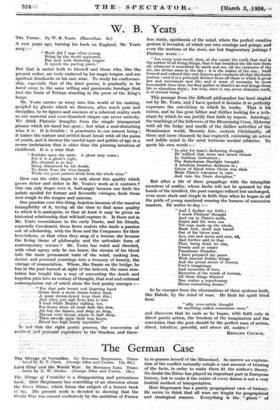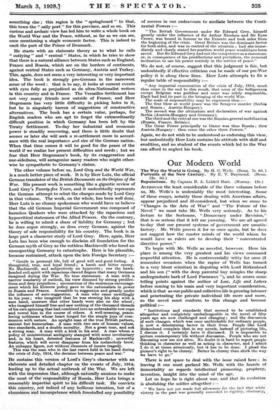The German Case
The Mirage of Versailles. By Hermann Stegemann. Trans- , :lated by B: T. Clark. (George- Allen and Unwin. 12s. 6d.) The Mirage of Versailles' is a disappointing and pretentious bnok. Herr'Stegemarm MIS something of an obsession about the River Rhine, which forms the subject of a former book of his His present work is devoted to showing that the World Wir was caused exehisively by the ambition of France to re-possess herself of the Rhineland. So narrow an explana- tion of the conflict naturally entails a vast amount of twisting of the facts, in order to make them fit the author's theory. No doubt the Rhine has played an important part in European history, but to make it the centre of every drama is not a very fruitful method of interpretation.
Herr Stegemann has a purely geographical view of history. He seems to think' that all wars are fought for geographical and strategical reasons. Everything is the " glacis" of
something else ; this region is the " springboard " to that, this town the " sally port " for this province, and so on. This curious and archaic view has led him to write a whole book on the World War and the Peace, without, so far as we can see, once mentioning a single economic factor. This is indeed to omit the part of the Prince of Denmark.
He starts with an elaborate theory as to what he calls " outlying " and " central " States, in which he tries to show that there is a natural alliance between States such as England, France and Russia, which are on the borders of continents, against central States such as Germany, Austria and Turkey. This, again, does not seem a very interesting or very important idea. The book is strongly pro-German in the narrowest sense of the word : that is to say, it looks at current events with eyes fully as prejudiced as do ultra-Nationalist writers in this country and in France. The Versailles Settlement has not very many friends now outside of France, and Herr Stegemann has very little difficulty in picking holes in it, but he is singularly barren of suggestions of constructive alternatives. The book has a certain value, perhaps, for English readers who are apt to forget the extraordinarily difficult position in which Germany has been left by the Treaty Settlement. To-day her industrial and economic power is steadily recovering, and there is little doubt that sooner or later she will seek a re-settlement more in accord- ance with the real importance and size of the German nation. When that time comes it will be good for the peace of the world if we realize her present difficulties and needs ; but we fear that Herr Stegemann's book, by its exaggeration and one-sidedness, will antagonize many readers who might other- wise be sympathetic to Germany's claims.
The other volume before us, Lord Grey and the World War, is a much better piece of work. It is by Herr Lutz, the official German translator of the British Documents on the Origins of the War. His present work is something like a gigantic review of Lord Grey's Twenty-five Years, and it undoubtedly represents the German attempt to rebut the charges made by Lord Grey in that volume. The work, on the whole, has been well done. Herr Lutz is no clumsy spokesman who would have us believe that the old German Imperial Government was composed of harmless Quakers who were attacked by the rapacious and hypocritical statesmen of the Allied Powers. On the contrary, he is willing to admit a share of liability for Germany ; but he does argue strongly, as does every German, against the theory of sole responsibility for his country. The book is in large part a character study of Lord Grey. Here, again, Herr Lutz has been wise enough to disclaim all foundation for the German myth of Grey as the ruthless Machiavelli who lured an unsuspecting Germany to catastrophe. Here is his plausible, because restrained, attack upon the late Foreign Secretary " Gentle in personal life, full of good will and good feeling. A thoughtful, true, and loyal friend ; a harsh and bitter enemy. No Machiavelli, and subjectively no hypocrite' nor the hawk- headed evil spirit with rapacious clawed fingers that many Germans imagined during the War. No true statesman. A man with a narrow insularity of outlook, his view dimmed by strong predilec- tions and deep prejudices ; unconscious of the enormous encourage- ment which his Entente policy gave to the nationalists in power in Russia and France. Accessible to suggestion and greatly under the influence of auto-suggestion. A man who came unwillingly to his post ; who imagined that he was steering his ship with a sure hand, unaware that other hands were also on the wheel ; who imagined himself free and saw nothing of the thousand threads of his own spinning that had combined into an unbreakable tow-rope and towed him in the course of others. A well-meaning, p- loving nobleman whose heart longed for the simple joys of corneace. munion with nature. An upright man of the true British pattern, earnest but humourless. A man with two sets of human values, two standards, and a double morality. Not a great man, and not a strong man A man with a kink in his soul. A man whom a policy of unintentional ambiguity stamped with some involuntary
i
and, in his heart, detested features of Machiavelli ; unworthy features which will never disappear from his melancholy brow. An unhappy figure, not without elements of innate tragedy.
This was the man who in the last resort held in his hand during the crisis of July, 1914, the decision between peace and war."
He sustains this version of Lord's Grey's character with an elaborate and detailed chapter on the events of July, 1914, reading up to the actual outbreak of the War. We are left with the impression that, aithotigh naturally anxious to make the most of the responsibility of Russia, Herr Lutz brings a reasonably impartial, spirit to his difficult task. He convicts this country, not indeed of any bellicose intention, but of a clumsiness and incompetence which forestalled any possibility of success in our endeavours to mediate between the Conti- nental- Powers :—
" The British Government under Sir Edward Grey, himself greatly under the influence of Sir Arthur Nicolson and Sir Eyre Crowe, was bound in honour to the Entente and took aides from the beginning of the crisis. Great Britain was the dominant factor for both sides, and was in control of the situation f had she imme- diately and clearly stated her position world peace would have been saved. But Sir Edward Grey had not the competence as a statesman or, in consequence of his predilections and prejudices, the personal inclination to use his power entirely in the service of peace."
We do not, of course, suggest that this judgment is fair, but undoubtedly if effective criticism can be made of our pre-War policy it is along these lines. Herr Lutz attempts to fix a regular table of responsibility :-
" Any impartial examination of the crisis of July, 1914, must thus come in the end to this result, that none of the' belligerents except Belgium was guiltless and none was solely responsible.- Each had had its part in the bringing of the world War. The scale of responsibility may be expressed thus :— The first blow at world peace was the Serajevo murder (Serbia and Russia ; Austria-Hungary). _ The second was the ultimatum and declaration of war against Serbia (Austria-Hungary and Germany).
The third and the critical one was the Russian general mobilization (Russia, France, Britain ).
The Great Power principally to blame was thus Russia ; then - Austria-Hungary : then come the other three Powers."
Again, we do not wish to be understood as endorsing this view, • but undoubtedly Herr Lutz sustains his attitude with skill and erudition, and no student of the events which led to the War can afford to neglect his book.































































 Previous page
Previous page